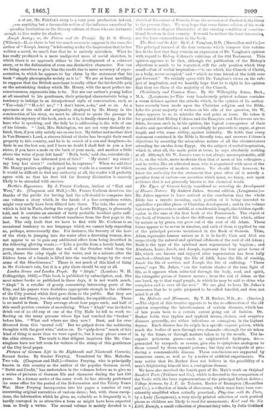thanks of the public for having had the self-denial to
compress into one volume a story which, in the hands of a less scrupulous writer, might very easily have been diluted into three. The tale, the scene of which is laid in Paris, during the reign of Louis Philippe, is pleasantly told, and it contains an amount of fairly probable incident quite suffi- cient to carry the reader without weariness from the first page to the last. The only fault that we have to find with Mr. Corkran is an occasional tendency to use language which we cannot help regarding as, perhaps, unnecessarily fine. For instance, the bravery of the hero of the story, in jumping into the water after a drowning woman, does not appear to us to gain any additional effect from being described in the following glowing words :--" Like a javelin from a heroic hand, the young mountaineer cleaves the wail of the October wind from the arch, chases the crisp ripple of the water, and in a minute after the lifeless form of a female is lifted into the washing-barge by the stout arms of the blanchisseuses." There is not much of this kind of thing in Mr. Corkran's tale, but it is a pity there should be any at all.






























 Previous page
Previous page